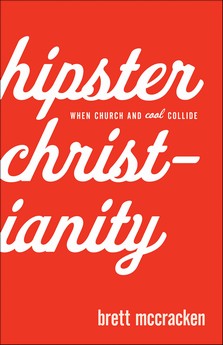By Jeff Goins, Editor
What is hipster Christianity?
 Hipster Christianity is, in short, the fusion of hipster culture-independent, alternative, anti-mainstream, fashionable-with Christianity. It’s a world of mostly twentysomething Christian evangelicals who grew up on CCM and hysteria about being in the “end times,” but now care more about things like social justice, creation
Hipster Christianity is, in short, the fusion of hipster culture-independent, alternative, anti-mainstream, fashionable-with Christianity. It’s a world of mostly twentysomething Christian evangelicals who grew up on CCM and hysteria about being in the “end times,” but now care more about things like social justice, creation
care, and whiskey tasting.
It’s a world where things like Left Behind, Jesus fish bumper stickers, and door-to-door evangelism are relevant only as a source of irony or nostalgia. It’s a world where Braveheart youth pastor analogies and Thomas Kinkade are anathema.
Hipster Christianity is about rebelling against the legalistic, overly political, apathetic-about-culture evangelicalism of the latter half of the 20th century. It’s a new iteration of youth-oriented, alternative, counter-cultural Christianity-the offspring of the Jesus movement of the 60s-70s but less Pentecostal and more liturgical (in a “postmodern pastiche” sort of way).
Do you consider yourself a Christian hipster?
By the definitions set out in the book, yes, I would have to consider myself a Christian hipster. Of course, it’s always a weird thing to call oneself any type of hipster. Hipsters tend to avoid the term. But as someone who listens to indie music, loves foreign film, enjoys smoking a pipe on occasion and wears Chuck Taylors and v-necks quite frequently, I definitely fit some of the hipster stereotypes.
You’ve written some on how twenty-somethings aren’t looking for “cool” at church. Can you talk about this, as it seems some churches have gone down this road of pursuing what’s cool?
I just really don’t think that “cool” is one of the attributes of church that will keep twentysomethings interested. We can get “cool” anywhere, so why go to church for it? Churches should be culturally engaged, to be sure, but not to the point that they are chasing after whatever fads and trends there are out there at any moment. This comes
across as desperate and awkward more often than not.
Ultimately, I think twentysomethings are looking for a church that is just down to earth, gospel-centered, Bible-preaching, relational, and service-minded. All the flashy accouterments and whiz-bang technologies are fine, but they can only do so much to keep people engaged. If a church is not about transformation and isn’t emphasizing biblical teaching and spiritual growth, it doesn’t matter how “cool” it is.
Is the impact of this trend inevitable for a 20- or 30-something on some levels?
I think so. This is an age when rebellion is a rite-of-passage. We want to fashion a a unique identity that is independent from parents, mainstream culture, authority, etc. And with regard to Christianity, I do think that any 20-30something Christian these days has to reckon with these issues to some degree. How can we not? We grew up in a Christianity that was so different from the world we encounter today. We have to reconcile the faith of our upbringing/tradition with the world we want to be relevant in and for today. But every generation goes through this.
 What is your favorite type of hipster?
What is your favorite type of hipster?
I like the kind that wear combat boots and Indian headdresses, face paint and big hoop earrings–parading around blowing bubbles and whistling Townes Van Zandt melodies (sometimes with harmonica). This sort of extravagant, Blade Runner-meets-Last of the Mohicans mish mash is greatly amusing to me. In the book I think the “Shaman Mystic” type comes closest.
What are some positive implications of hipster Christianity?
I think Christian hipsters tend to care a lot about art and culture, and have a healthy (I think) love of “good things.” They value aesthetics and they appreciate well-made things (whether music, food, beer, etc). They seem to genuinely appreciate God’s creation and are curious and awestruck by it, which is something I sometimes think
mainstream evangelicalism is lacking. Also, I think the hipster emphases on social justice, caring for the environment, and generally being engaged in world issues can offer some helpful lessons for mainstream evangelicalism.
Is this trend just this generation’s version of rebelling against the status quo, or is something unique happening here?
Yeah, on one hand it definitely is just the whole rite-of-passage rebellion thing. But I also think that the culture today has made rebellion against the status quo much more accessible and almost expected. Rebellion is almost like the new mainstream.
So you have all these churches and institutions and corporations adopting “alternative” styles and the look of rebellion, because it just carries so much power in the marketplace today. So I think the whole hipster thing is amplified in certain ways today because of various cultural/economic factors.
What do you want people to get out of your book, and how can they find out more about you?
I hope people get knowledge and insight about this particular moment in evangelical history–what the challenges are for this generation in thinking through our identity as Christians and our position toward culture. I hope people get a reminder in the book about what is TRULY cool about Christianity and how distracted we get by all the accompanying sideshows that have to do with “being relevant” to the culture. We are most relevant when we are most biblical. Bottom line. I hope that’s the message people get from Hipster Christianity.
As for more information about me. Check out my blog or website.
 Jeff graduated from Illinois College, a small liberal arts school, with a degree in Spanish and Religion. He lives in Nashville, TN with his wife Ashley. He works for Adventures in Missions, edits this silly little magazine, and loves to do new things. Check out his blog: Pilgrimage of the Heart.
Jeff graduated from Illinois College, a small liberal arts school, with a degree in Spanish and Religion. He lives in Nashville, TN with his wife Ashley. He works for Adventures in Missions, edits this silly little magazine, and loves to do new things. Check out his blog: Pilgrimage of the Heart.
